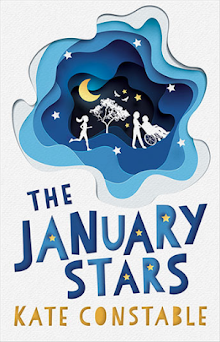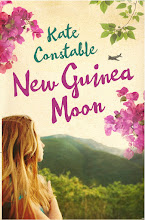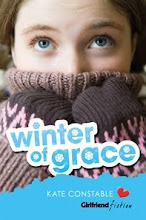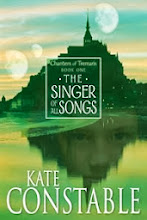How's that for a title? Settle down, it's not what you think. How Nell Scored is in fact an old-fashioned adventure story, set in New Zealand, involving a shipwreck, stolen pearls, and a cross-country trek by the eponymous young heroine (who is forced to hide up a tree at one point, though probably less gracefully than depicted on the cover).
I think this book was first published in 1933, and it certainly shows its age -- the two sons of the family are both away at school, being educated, while the two daughters stay at home to help on the farm. Not fair, or even particularly logical, since the boys will presumably inherit the farm eventually. The book opens with Nell exhorting her sister not to cry in front of their parents, and shaking her vigorously to drive her point home.
Bessie Marchant was an insanely prolific English author who produced dozens of books like this, often set in exotic locations: Ceylon, Sudan, Uruguay, Canada. She married a clergyman with the gorgeous name of Jabez Ambrose Comfort -- maybe it was the name that appealed, because he was 28 years older than her. It's easy to mock Marchant's output and her far-flung settings (she doesn't seem to have ever visited any of the places she wrote about) but she did challenge the gender sterotypes of her time by putting young girls in the middle of the kinds of adventures that usually featured boys. So good on you, Bessie.
29.1.19
27.1.19
Illuminae
Can I confess that my heart sank a little when I saw the thickness of this novel? And that I cursed the name of the book group member who suggested we read it, then quit the group? (Sorry Heather -- I forgive you).
Because it turned out that Illuminae was a lot of fun to read, and it must have been even more fun to write. Amie Kaufman and Jay Kristoff (disclaimer: I met them both at a dinner a few years ago, round the time this book came out, and they were both lovely) have collaborated to create an unconventional narrative, stitched together from purported transcripts of security briefings, private text messages, surveillance reports... and the inner thoughts of a rogue computer...
This immediately gives Illuminae a distinctive look and feel; but to Kaufman and Kristoff's credit, the substance of the story matches the style. Set mainly on three stranded spaceships, there is a space plague that creates violent paranoia in its victims, a secret mining base, missing family members, and a pair of smart teens who were inconveniently negotiating a break-up at the very moment their home was blown to pieces. How Ezra and Kady manage to reconnect, and then cooperate to survive and fight back is at the core of the story.
I enjoyed this book a lot. There are two more volumes in the Illuminae Files, and I'm sure they are just as satisfying as the first.
Because it turned out that Illuminae was a lot of fun to read, and it must have been even more fun to write. Amie Kaufman and Jay Kristoff (disclaimer: I met them both at a dinner a few years ago, round the time this book came out, and they were both lovely) have collaborated to create an unconventional narrative, stitched together from purported transcripts of security briefings, private text messages, surveillance reports... and the inner thoughts of a rogue computer...
This immediately gives Illuminae a distinctive look and feel; but to Kaufman and Kristoff's credit, the substance of the story matches the style. Set mainly on three stranded spaceships, there is a space plague that creates violent paranoia in its victims, a secret mining base, missing family members, and a pair of smart teens who were inconveniently negotiating a break-up at the very moment their home was blown to pieces. How Ezra and Kady manage to reconnect, and then cooperate to survive and fight back is at the core of the story.
I enjoyed this book a lot. There are two more volumes in the Illuminae Files, and I'm sure they are just as satisfying as the first.
24.1.19
The Princess Diaries
Our first theme for the Convent book club this year is Epistolary narratives. Unfortunately Meg Cabot's The Princess Diaries is in diary rather than letter form, but never mind!
I can see why this novel spawned a highly successful series and movies. Mia is a breezy, funny teen who is more concerned about the social consequences of her mother dating her maths teacher than the fact that she herself turns out to be the hair to the throne of a European principality. At fourteen, Mia agonises over her crushes, her hair, and myriad possibilities of social embarrassment, but she doesn't seem to think particularly deeply about anything else, which made this an easy, amusing read, but not a very meaningful one.
Published in 2001, the references to technology have already dated. Mia receives 'princess lessons' from her exacting French grandmother, which revolve around etiquette, though one would think politics might be useful, too. When I imagined being a princess at twelve or thirteen, I saw my alter ego making unexpected diplomatic interventions, not just sweeping around in gorgeous ball gowns (though to be fair, there was a bit of that, too). But maybe that was just me!
I can see why this novel spawned a highly successful series and movies. Mia is a breezy, funny teen who is more concerned about the social consequences of her mother dating her maths teacher than the fact that she herself turns out to be the hair to the throne of a European principality. At fourteen, Mia agonises over her crushes, her hair, and myriad possibilities of social embarrassment, but she doesn't seem to think particularly deeply about anything else, which made this an easy, amusing read, but not a very meaningful one.
Published in 2001, the references to technology have already dated. Mia receives 'princess lessons' from her exacting French grandmother, which revolve around etiquette, though one would think politics might be useful, too. When I imagined being a princess at twelve or thirteen, I saw my alter ego making unexpected diplomatic interventions, not just sweeping around in gorgeous ball gowns (though to be fair, there was a bit of that, too). But maybe that was just me!
21.1.19
Truly Madly Guilty
Ah, Liane Moriarty. The easy summer read you don't need to feel bad about. Liane Moriarty has made a specialty of producing satisfyingly chunky, eminently readable (and 'relatable' -- hate that word!) suburban stories which sneakily also tackle some big issues -- family violence, alcoholism, damaged childhoods.
Truly Madly Guilty (which I borrowed from my friend Justine) revolves around events that occur at an ordinary suburban barbecue* -- six adults, three children -- and what goes wrong when people are distracted. Everyone at that barbecue has their own reason to feel guilty about their behaviour that afternoon, and their individual responses to that day weave into an absorbing, sometimes funny, sometimes moving, narrative.
It's great to know that an Australian author has had such international success with books that are still solidly Australian. She makes it look easy, but of course it isn't. Her sister Jaclyn is also a writer (in my view, a genius). What a talented family they are -- not ordinary at all.
*Barbecue or barbeque? I use the former spelling, this book used the latter. I know it's also correct, but it just looks wrong to me!
Truly Madly Guilty (which I borrowed from my friend Justine) revolves around events that occur at an ordinary suburban barbecue* -- six adults, three children -- and what goes wrong when people are distracted. Everyone at that barbecue has their own reason to feel guilty about their behaviour that afternoon, and their individual responses to that day weave into an absorbing, sometimes funny, sometimes moving, narrative.
It's great to know that an Australian author has had such international success with books that are still solidly Australian. She makes it look easy, but of course it isn't. Her sister Jaclyn is also a writer (in my view, a genius). What a talented family they are -- not ordinary at all.
*Barbecue or barbeque? I use the former spelling, this book used the latter. I know it's also correct, but it just looks wrong to me!
15.1.19
Lost Connections
Another incredible book to start off my reading year! Johann Hari's Lost Connections is subtitled Uncovering the real causes of depression -- and the unexpected solutions. I'd asked for it as a Christmas present, but before I had a chance to read it myself, it was co-opted by my beloved, who has been suffering from severe depression. It is a great recommendation that he not only read it cover to cover (concentration has been a problem) but found it helpful and persuasive.
The Western world is currently experiencing unprecedented levels of anxiety and depression, and we are also more medicated with anti-depressants than ever before. (In my own household, four out of five of us are taking happy pills.) But Johann Hari argues that there is actually very little evidence that these medications do much to help. Sure, they do something to our bodies, and they are very difficult to wean ourselves off. But do they make us happier, more stable? Do they raise our serotonin levels or whatever they are supposed to be doing? Hari argues convincingly that they don't. (Thank you Big Pharma.)
So what does make a difference? And how did we get here? According to Hari (and I have to agree) we are really suffering from a lack of connection in our lives. This can be expressed in many ways -- lack of meaningful relationships, lack of meaningful work, lack of connection to nature. And the solutions, not surprisingly, involve reconnecting.
This was a stimulating and engaging read, filled with lively personal anecdotes and enlightening information. It's extremely readable, and packed with food for thought. The only downside is that most of Hari's recommendations involve a radical reorganisation of the whole of society, though there are things a depressed individual can do to help themselves.
But the most helpful thing would be a revolution in the way we live. Highly recommended.
The Western world is currently experiencing unprecedented levels of anxiety and depression, and we are also more medicated with anti-depressants than ever before. (In my own household, four out of five of us are taking happy pills.) But Johann Hari argues that there is actually very little evidence that these medications do much to help. Sure, they do something to our bodies, and they are very difficult to wean ourselves off. But do they make us happier, more stable? Do they raise our serotonin levels or whatever they are supposed to be doing? Hari argues convincingly that they don't. (Thank you Big Pharma.)
So what does make a difference? And how did we get here? According to Hari (and I have to agree) we are really suffering from a lack of connection in our lives. This can be expressed in many ways -- lack of meaningful relationships, lack of meaningful work, lack of connection to nature. And the solutions, not surprisingly, involve reconnecting.
This was a stimulating and engaging read, filled with lively personal anecdotes and enlightening information. It's extremely readable, and packed with food for thought. The only downside is that most of Hari's recommendations involve a radical reorganisation of the whole of society, though there are things a depressed individual can do to help themselves.
But the most helpful thing would be a revolution in the way we live. Highly recommended.
14.1.19
Lies Sleeping
What better start to the reading year than the latest installment of Ben Aaronovitch's Rivers of London series, Lies Sleeping? I gorged on this novel like a box of Christmas chocolates.
There are so many things to love about this series -- the thrilling combination of modern police procedural and ancient magic; the humour and smarts of apprentice wizard and Detective Constable Peter Grant; the diverse cast, an accurate reflection of a modern city; and the ageless history of that same history which continually intrudes upon the present, through Peter's architectural asides or the river gods and goddesses.
Okay, so I sometimes get confused about the plot and the burgeoning multitude of characters (probably because I haven't kept up with the comics and short stories set in the same universe), but it doesn't spoil my delight. I owe a huge debt to Memoranda for putting me onto these books; see Michelle's review here.
There are so many things to love about this series -- the thrilling combination of modern police procedural and ancient magic; the humour and smarts of apprentice wizard and Detective Constable Peter Grant; the diverse cast, an accurate reflection of a modern city; and the ageless history of that same history which continually intrudes upon the present, through Peter's architectural asides or the river gods and goddesses.
Okay, so I sometimes get confused about the plot and the burgeoning multitude of characters (probably because I haven't kept up with the comics and short stories set in the same universe), but it doesn't spoil my delight. I owe a huge debt to Memoranda for putting me onto these books; see Michelle's review here.
7.1.19
Reading Roundup 2018 (now with added pie charts...)
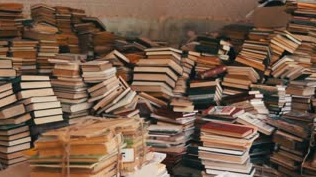 | |||
| My pile of TBR books in the wardrobe... |
EDIT: Okay, I made the effort and did the pie charts! I was just being slack.
Total Books Read in 2018: 89
This total is well down on previous years. Maybe I had less time. Maybe I was reading more demanding, longer books. Maybe a bit of both.
Children's/YA books: 34
Adult books: 55
In past years, this number has been more evenly balanced, or even tilted toward the children's books tally. This year I read fewer children's books for pleasure; most of the YA I read was for book club commitments. I think in 2018 I was seeking my comfort reading elsewhere!
Books by female authors: 61
Books by male authors: 21
Books with a mixed authorship: 7
Wow. The ladies definitely have it this year! Mind you, a good portion of this total consists of Dorothy L Sayers, so that laid a good fat weight on the scales.
Fiction titles: 51
Non-fiction: 38
As usual, I read more fiction than non-fiction this year, though I did read more non-fiction than usual.
Secondhand books: 45
Library books: 11
Borrowed from friends: 4
Kindle: 7
Re-read: 13
New: 9
Not many e-books this year, though I read three books on my phone. The other Kindle purchases were mostly desperation book club titles. I'd like to think I didn't buy as many secondhand books as in previous years, but I don't dare even go back and check.
UK authors: 38
US authors: 22
Australian authors: 19
Other: 8
The Other category includes Canadian, Irish, French and Italian authors. But clearly I still favour UK authors over all others; I'm not even fighting it any more.
Notable books in 2018
I did a massive, massive binge on Dorothy L Sayers books in 2018. I read all the Peter Wimsey novels and they vastly improve once Harriet appears on the scene. My favourites of the series are Gaudy Night (by a long way, as it's mostly Harriet) and The Nine Tailors (despite no Harriet at all).
I also read a significant number of books about depression, anxiety and psychotherapy. Some were extremely helpful; some were very interesting; some were, unfortunately, neither. The best is one I technically read in early 2019, which I will discuss in a forthcoming post.
I finished the Elena Ferrante Neapolitan novels, which were recommended to me by my dear friend Sandra Eterovic. We never did get round to discussing them properly, and now it's too late.
My favourite fiction came late in the year: Normal People, by Sally Rooney, which was a gift from another brilliant friend, Bridget. Hurry up and write more books, Sally!
The books which made the deepest impression on me in 2018 were, as is often the case, non-fiction.
A Wink From the Universe by Martin Flanagan helped me relive the magic of the Western Bulldogs unlikely 2016 premiership victory.
Deep Time Dreaming by Billy Griffiths is a masterful survey of Australia's archeological history. Readable, fascinating, and not dry at all.
Bookworm by Lucy Mangan was huge fun, nostalgic and delightful. Please be my new best friend, Lucy!
Wildwood by Roger Deakin is a moving and beautiful collection of meditations, portraits and explorations of a vast subject -- humanity's relation to trees and wood. A lovely book that has haunted me.
6.1.19
Riding the Bus With My Sister
Happy New Year to you all. I must say I'm very pleased to say farewell to 2018, which was a horrible year in many ways, but I'm hoping for a greatly improved 2019!
Riding the Bus With My Sister is Rachel Simon's account of a year she spent with her intellectually disabled sister, Beth. Beth doesn't work; she prefers to spend her days hopping the bus routes of her home town (a small, unnamed, American city). Beth gets up at 5am to catch the first bus of the day; she knows all the drivers and many of the passengers know her. At first Rachel is inclined to see Beth's obsession as a waste of time, but as she too gets to know the drivers, with their patience, wisdom, humour and philosophy, she begins to see the value in slowing down and making connections (more on that topic later...)
I was drawn to this book because I also have a younger sister with an intellectual disability, and I have also been tormented by those guilty thoughts that I'm a 'bad sister' -- not supportive enough, impatient, sometimes bored. I have wrestled with the same dilemmas that Rachel struggles with: when to allow Beth the freedom to live her life the way she chooses, and when to act in her sister's best interests, even when she resists (for example, when Beth risks her sight by refusing an eye operation).
I could see many parallels between Beth and my sister. They both hate being 'bossed'; they can both be extremely stubborn. They can develop overwhelming crushes on people. If they disagree with you, they don't argue back; instead, they just shut down, presenting a blank wall of passive resistance. This book helped me to see that these tactics are not just infuriating quirks, but a logical response to a complex, sometimes incomprehensible world where people are always trying to get you to do stuff even if you can't understand why. Beth and my sister both cling fiercely to their independence and their privacy, to that small secure space they've been able to carve out for themselves. They don't like change. They are hyper-aware of 'meanness' and any hint of bullying. They can seem self-centred, but perhaps that's a survival technique too. When you have to spend so much of your time and energy protecting yourself, there's not a lot left over for empathising with others.
As a result of reading Riding the Bus With My Sister, I've joined a Facebook group for adult siblings of people with disabilities, and already I can see that most people have to deal with far more severe problems than my sister. She has a job, she has paid off her own house, she lives independently and mostly happily. Her life is hard at times, and I have to remember that. But we have a lot to be grateful for, too.
Riding the Bus With My Sister is Rachel Simon's account of a year she spent with her intellectually disabled sister, Beth. Beth doesn't work; she prefers to spend her days hopping the bus routes of her home town (a small, unnamed, American city). Beth gets up at 5am to catch the first bus of the day; she knows all the drivers and many of the passengers know her. At first Rachel is inclined to see Beth's obsession as a waste of time, but as she too gets to know the drivers, with their patience, wisdom, humour and philosophy, she begins to see the value in slowing down and making connections (more on that topic later...)
I was drawn to this book because I also have a younger sister with an intellectual disability, and I have also been tormented by those guilty thoughts that I'm a 'bad sister' -- not supportive enough, impatient, sometimes bored. I have wrestled with the same dilemmas that Rachel struggles with: when to allow Beth the freedom to live her life the way she chooses, and when to act in her sister's best interests, even when she resists (for example, when Beth risks her sight by refusing an eye operation).
I could see many parallels between Beth and my sister. They both hate being 'bossed'; they can both be extremely stubborn. They can develop overwhelming crushes on people. If they disagree with you, they don't argue back; instead, they just shut down, presenting a blank wall of passive resistance. This book helped me to see that these tactics are not just infuriating quirks, but a logical response to a complex, sometimes incomprehensible world where people are always trying to get you to do stuff even if you can't understand why. Beth and my sister both cling fiercely to their independence and their privacy, to that small secure space they've been able to carve out for themselves. They don't like change. They are hyper-aware of 'meanness' and any hint of bullying. They can seem self-centred, but perhaps that's a survival technique too. When you have to spend so much of your time and energy protecting yourself, there's not a lot left over for empathising with others.
As a result of reading Riding the Bus With My Sister, I've joined a Facebook group for adult siblings of people with disabilities, and already I can see that most people have to deal with far more severe problems than my sister. She has a job, she has paid off her own house, she lives independently and mostly happily. Her life is hard at times, and I have to remember that. But we have a lot to be grateful for, too.
Labels:
book response,
disability,
family,
non-fiction
Subscribe to:
Posts (Atom)















